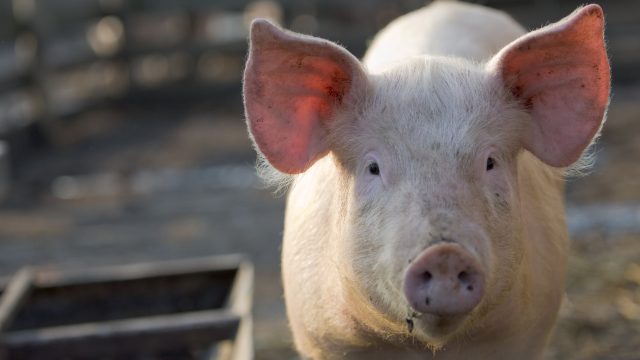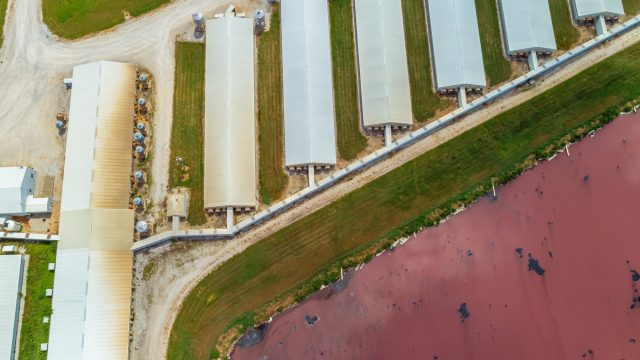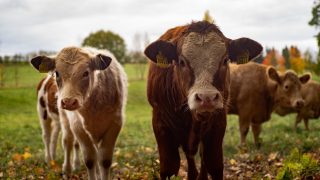
Animal Legal Defense Fund Student Chapters around the country celebrate October as Speak Out for Farmed Animals Month (SOFAM), a month of action dedicated to raising public awareness nationwide about the lack of meaningful laws that protect farmed animals from cruel treatment.
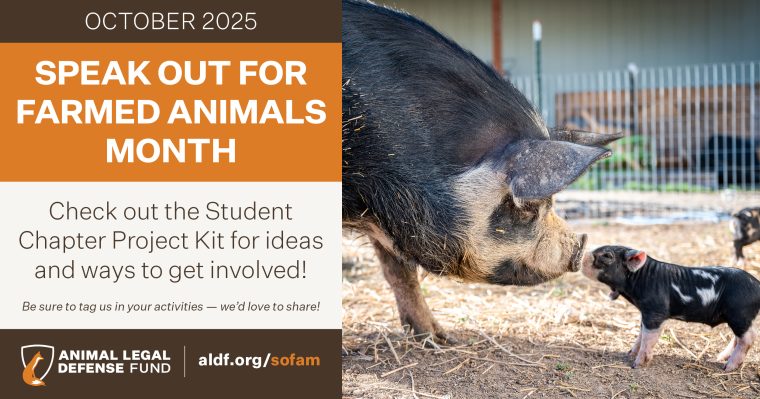
This Student Chapter Project Kit contains activity suggestions, resources, ideas, and action items — everything needed to make planning and executing SOFAM events with ease (and fun!)
Farmed animals are among the most exploited animals in industries and private use across the country yet are the least protected when it comes to the laws that impact their lives and wellbeing. We encourage students to think critically about these industries, uses, and what constitutes a farmed animal. Under federal law, farmed animals are considered “livestock” and defined as “…cattle, sheep, horses, goats, and other domestic animals ordinarily raised or used on the farm…”[i] but how do you define a farmed animal? Chickens and turkeys, for example, are not included in the federal definition but are routinely raised, tortured, and slaughtered for food; both wild-caught and farmed fish are part of these industries, without protection; dogs are bred and raised for profit in puppy mills that resemble that of factory farms; mink and foxes are bred, raised, and killed for their fur in farmed conditions.
Speak Out for Farmed Animals Month is an opportunity to consider who we are speaking about when we discuss farmed animals, the challenges we face in protecting them — legally, socially, and economically — and possible solutions moving forward.
We would love to hear about the amazing work your chapter accomplishes during Speak Out for Farmed Animals Month! While this project kit offers suggested events and opportunities, it is not an exhaustive list. If your chapter is doing something not featured, please let us know your great ideas by sharing on your chapter’s social media channels.
Below, you will find suggested events and action items for your student chapter to participate in, along with any relevant materials or additional information that is needed.
PROJECT IDEAS
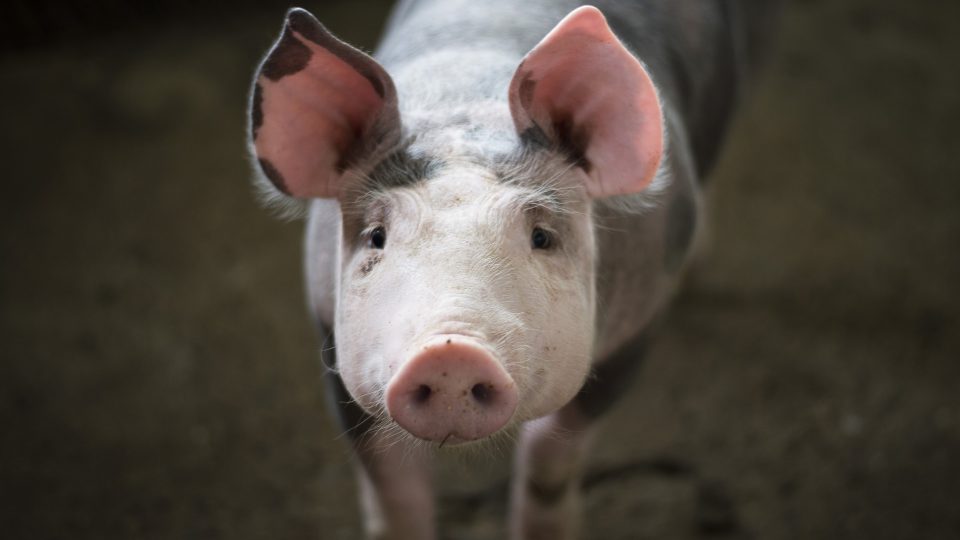
Student chapters may apply for project grants to help cover costs, and there is no cap on number of times that a chapter can apply. Grants can cover plant-based food, books, and more! Funding is on a rolling basis.
![]()
Contact Elected Officials and Educate Your Community
![]() In early 2025, the Animal Legal Defense Fund filed a lawsuit against the USDA for the unlawful failure to protect “downed” or “non-ambulatory” pigs at slaughterhouses. This lawsuit was filed as part of a coalition of animal protection organizations and argues that the USDA has failed to fulfill its statutory duty by not instituting regulations prohibiting the slaughter of pigs who cannot walk or stand.
In early 2025, the Animal Legal Defense Fund filed a lawsuit against the USDA for the unlawful failure to protect “downed” or “non-ambulatory” pigs at slaughterhouses. This lawsuit was filed as part of a coalition of animal protection organizations and argues that the USDA has failed to fulfill its statutory duty by not instituting regulations prohibiting the slaughter of pigs who cannot walk or stand.
Many of you are likely familiar with the 2002 amendment to the Humane Methods of Slaughter Act that instructed the USDA to investigate and report on non-ambulatory animals at slaughterhouses. This instruction included pigs and, based on findings, the USDA was ordered to promulgate regulations as needed to ensure their humane treatment, handling, and disposition. While the USDA subsequently promulgated regulations to prohibit the slaughter of non-ambulatory cows and calves, the USDA has failed to do so for pigs.
Without regulations prohibiting the slaughter of non-ambulatory pigs, pig producers are incentivized to send weakened animals to slaughter. The coalition seeks to end documented practices that show downed pigs being kicked, shoved, electrocuted, and dragged by slaughterhouse workers in an attempt to get them to move.
On behalf of SOFAM 2025, we invite student chapters and members to raise awareness for the Pigs and Public Health Act, what it means, and why it matters. You will find resources on the issue, along with guidance on how to contact your representatives, talking points, and different ways of getting involved.
- Congress.gov bill page (text, sponsors, actions, etc)
- Rep. Escobar’s press release
- Letter to USDA calling for regulations re: downed pigs
- Letter to President Biden calling for regulations re: downed pigs
- ALDF’s Action Alert
- ALDF’s Pigs and Public Health factsheet
- Downed pigs coalition lawsuit – Farm Sanctuary v. Perdue
- ALDF’s downed pigs case summary
- How to contact your elected officials
As a chapter or as an individual, your voice matters! If your chapter is interested in a more advanced project, including setting up in-person meetings or a letter campaign, reach out to Priscilla directly at prader@aldf.org.
Student Facilitated Presentations and Webinar Screenings
![]() Student presentations at chapter meetings are highly recommended! They provide public speaking opportunities for chapter officers and substantive learning on an animal law issue.
Student presentations at chapter meetings are highly recommended! They provide public speaking opportunities for chapter officers and substantive learning on an animal law issue.
The rise of virtual presentation options offers students more ways to gain much-needed public speaking and presentation experience while in law school. Public speaking skills are essential in practicing law, including the ability to explain a complicated legal subject in a way the audience can understand.
Presentation tips and resources
We encourage student chapter officers to present on farmed animals or Ag-Gag laws, either by following an Animal Legal Defense Fund presentation or creating your own.
The event format is flexible! Feel free to supplement your student presentation by streaming the short video on Ag-Gag laws or the video explainer by Alicia Prygoski on the Pigs and Public Health Act.
The logistical and creative suggestions listed below will help you get started:
- Assign a student to be the presenter, or multiple students to each take a portion.
- During practice, work on your phrasing and pacing. It isn’t only what you say but how you say it, and practicing sentence structures, pauses, and inflections can be a big help in gaining confidence.
- To help calm any nerves, take a deep breath before beginning! Remind yourself that your audience consists of your peers and that they’re likely impressed by your leadership and drive.
- Once prepared, trust that you understand the information that you’re presenting. A speaker is not required nor expected to know everything. Write down the question and facilitate a response after the event.
- Speak slower than what likely comes naturally. Try to replace verbal pauses with silent pauses. The extended silence might seem awkward at first, but it’s barely noticeable to the audience. It keeps your communication clear.
- If you notice that you’re talking too fast and struggle with slowing down, it’s time for a pause! I recommend having a glass of water nearby and remembering to take another deep breath. It’s OK to take a few seconds to recenter.
- Feel free to insert your own experiences or insights into the presentation to make it feel more personalized.
- If you have any specific questions or would like to chat with someone, reach out to us at alp@aldf.org. We are happy to work with you to prepare.
- Schedule a date and time for the presentation, and reserve a room on campus.
- Arrange for lunch, and apply for a project grant to cover plant-based food costs. Or combine the presentation with a potluck social!
- Create a flier or share graphics to promote the event to chapter members.
- Practice the presentation with fellow chapter officers to gain confidence!
- If needed, seek additional information on Ag-Gag to help prepare” to “If needed, seek additional information on the Pigs and Public Health Act to prepare.
- Assign a student to introduce the presenter, moderate the Q&A discussion, and assist with any technological issues.
- Present and have fun! After the presentation, consider leaving time for Q&A. Have a couple questions prepared in advance in case the audience is shy.
Host a Documentary Screening & Discussion
![]() Documentary screenings are an entertaining way to learn about different issues within animal law and foster productive conversations. They offer an accessible inside look into topics that might not be covered in law classes.
Documentary screenings are an entertaining way to learn about different issues within animal law and foster productive conversations. They offer an accessible inside look into topics that might not be covered in law classes.
Documentary recommendations
Below is a list of available documentaries that can be screened virtually through Teleparty and Amazon, or in-person with a license. Please be mindful of the platforms’ Terms of Use — they do not allow public performance, and there are restrictions on the educational exemption. Some require a screening license to show the documentary to your chapter. Main campus and law school libraries are a great resource and may have access to several films with performance rights.

Recommended Documentaries:
- NEW: Smell of Money follows Elsie Herring and her rural North Carolina community as they take on the multi-billion-dollar pork industry to demand cleaner air, safer water, and better living conditions. This documentary is available for community screenings and your chapter can request to host one locally.
- Hog Haven has been screened at several Animal Legal Defense Fund Student Chapter events. The Hog Haven team also offers speaking engagements that can be planned in-person or virtually. If you are interested in screening this documentary, reach out directly to the director, Christopher Beeson (Be sure to scroll all the way down to the bottom!)
- Cowspiracy: The Sustainability Secret is a documentary that discusses the destructive animal agricultural industry and its effect on the animals and the environment. This documentary can be streamed on Netflix through Teleparty. View the Cowspiracy discussion guide.
- Seaspiracy dives into the harm that humans cause to marine species, including the fishing and aquaculture industries. This documentary can be streamed on Netflix either through Teleparty or in-person through the Netflix Media Center. View the Seaspiracy discussion guide.
- End of Meat is a documentary that envisions a future where meat consumption belongs to the past. The filmmaker embarks on a journey to discover what effect a post-meat world would have on the environment, the animals, and ourselves. This documentary can be streamed through Amazon Prime as a watch party. View the End of Meat discussion guide.
- For more film screening ideas, check out our full list of documentaries. We recommend reviewing the screening rights and restrictions in advance.
Apply for a Student Chapter Project Grant to help cover plant-based food costs.
Host or Join a Speaker Event
![]() Hosting a speaker event is a quintessential chapter project! Chapters can request a speaker from the Animal Legal Defense Fund year-round.
Hosting a speaker event is a quintessential chapter project! Chapters can request a speaker from the Animal Legal Defense Fund year-round.
Student chapters can also apply for a project grant to help cover plant-based food options for lunch at a speaker event.
Get Involved on Social Media
![]() Social media is an invaluable tool for educating others about animal law issues and building community engagement. Use this month to reach a wider audience with our content suggestions below, or as an excuse to create a social media presence if your chapter hasn’t yet. There are endless content possibilities and topics to explore!
Social media is an invaluable tool for educating others about animal law issues and building community engagement. Use this month to reach a wider audience with our content suggestions below, or as an excuse to create a social media presence if your chapter hasn’t yet. There are endless content possibilities and topics to explore!
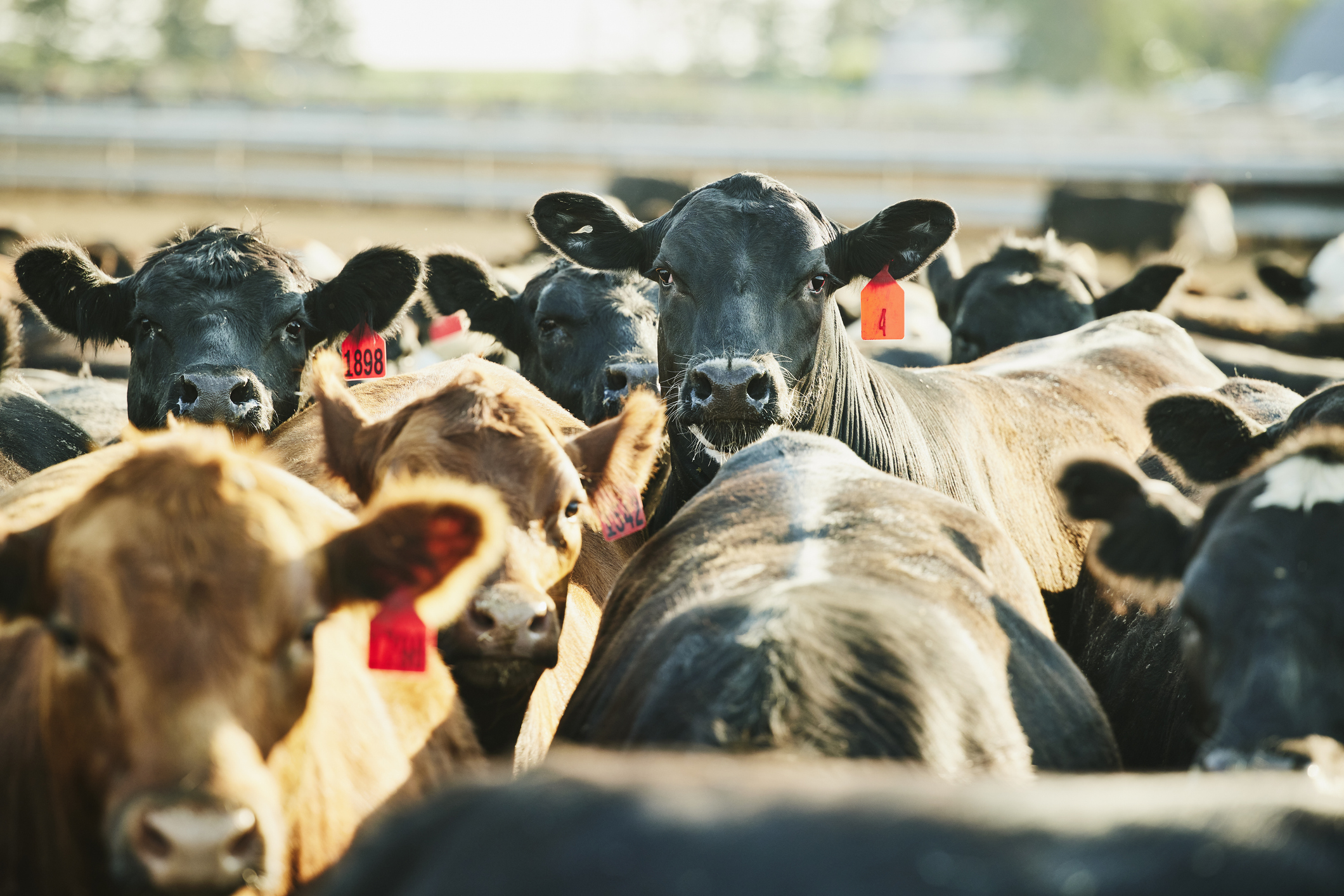
Create an Instagram Reel or TikTok
![]() Create video content on a farmed animal topic. Use the hashtag #ALDFSOFAM for a chance to be featured on our Animal Legal Defense Fund social media accounts.
Create video content on a farmed animal topic. Use the hashtag #ALDFSOFAM for a chance to be featured on our Animal Legal Defense Fund social media accounts.
Video topic ideas
- 101 on the (lack of) laws that protect farmed animals in the U.S.
- Animal issues relevant to your local area or state
- Ag-Gag laws and/or whistleblower protection
- False advertising and “humane washing”
- Aquaculture
- Environment and animal protection
- Workers’ rights and public safety
- Animal rescue story, or sanctuary animals expressing natural behaviors
- Farmed animals’ treatment
Change Profile Pic to ‘Speak Out’ Graphic
![]() Student chapter members are encouraged to change their social media profile pictures to one of the available farmed animal avatars to show support all month.
Student chapter members are encouraged to change their social media profile pictures to one of the available farmed animal avatars to show support all month.
View the avatars
![]()
![]()
![]()
![]()
![]()
Follow Us on Social Media & Cross-post
![]() Be sure to follow the Animal Legal Defense Fund’s social media channels – Instagram, Twitter, TikTok, Facebook – and share posts! Chapters may also download social media graphics to share directly.
Be sure to follow the Animal Legal Defense Fund’s social media channels – Instagram, Twitter, TikTok, Facebook – and share posts! Chapters may also download social media graphics to share directly.
View the social media share graphics
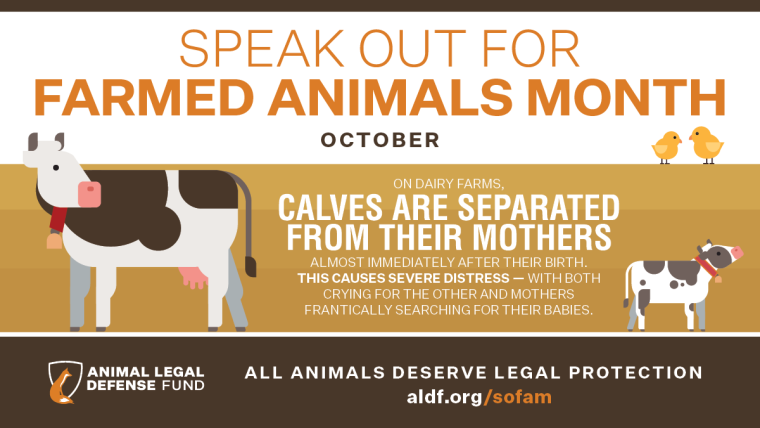
Cow graphic
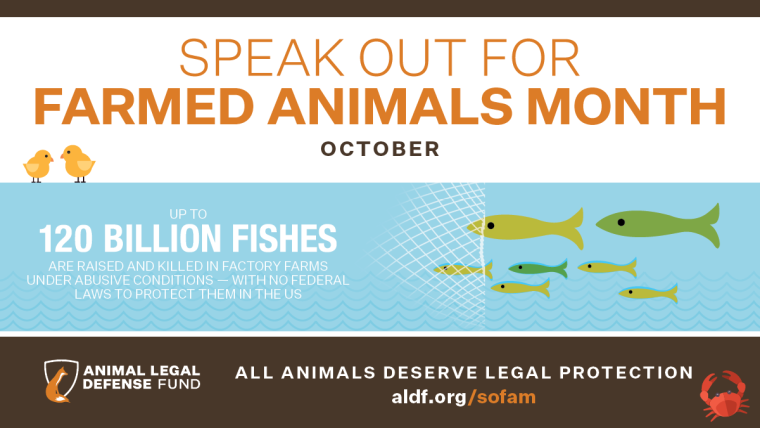
Fish graphic
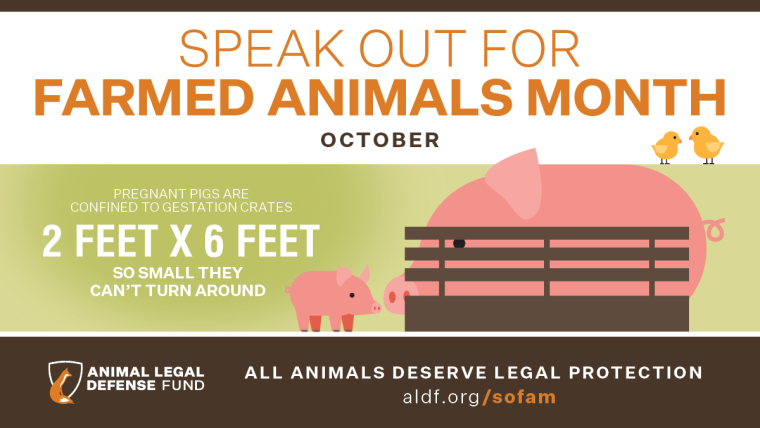
Pig graphic
Tabling on Behalf of Farmed Animals
![]() Tabling is a great way to directly engage with your law school community and inform them about the importance of animal issues, ways to get involved, and upcoming events. Student chapters can request Speak Out for Farmed Animals tabling materials.
Tabling is a great way to directly engage with your law school community and inform them about the importance of animal issues, ways to get involved, and upcoming events. Student chapters can request Speak Out for Farmed Animals tabling materials.
Tabling tips
- Organize your table so that farmed animal brochures and freebies are visible.
- Have at least one action item. Some examples include:
- Signing up for the chapter’s email list
- Signing up for the Animal Legal Defense Fund email updates
- Signing the Ag-Gag Hurts Animals petition
- Watch a video by the Animal Legal Defense Fund on Ag-Gag laws, biogas, or dairy farm cruelty
- Learn more about the conditions and treatment of downed pigs so you can educate others on the issue and how to help.
- Have fun and be responsive! Sometimes people can feel unsure coming up to a table, so put their mind immediately at ease with a welcoming vibe, snacks, and freebies that they can take with them.
- Encourage chapter members to join in tabling. It’s an easy way to practice and gain confidence discussing animal issues, as well as learn what interests other students.
- Take pictures!
- Apply for a project grant to help cover plant-based snacks for the table.
Contains Animals Campaign
![]() Student chapters are invited to participate in the ALDF Contains Animals Campaign. Consumers care about what they eat and have a right to know what’s in the food they purchase. Yet, current Food and Drug Administration (FDA) regulations are inadequate when it comes to animal-derived ingredients. A recent pair of studies found that adding a “contains animal-derived ingredients” disclaimer to food packaging increased consumers’ ability to identify when foods contained animal-derived ingredients.
Student chapters are invited to participate in the ALDF Contains Animals Campaign. Consumers care about what they eat and have a right to know what’s in the food they purchase. Yet, current Food and Drug Administration (FDA) regulations are inadequate when it comes to animal-derived ingredients. A recent pair of studies found that adding a “contains animal-derived ingredients” disclaimer to food packaging increased consumers’ ability to identify when foods contained animal-derived ingredients.
To educate your community about what’s actually in the food they purchase and consume, do one, two, or even all of the activities listed below!
- Print out our fact sheets and helpful documents to display at your table. You can use provoking language to attract students, such as “Are there feathers in your food?” or “Learn more about the hooves in your candy.”
- Offer plant-based alternatives to the products discussed as giveaways. Check out the list of animal derived ingredients and select a few to highlight.
- Trivia and prizes! Trivia is a fun way to learn and engage with others on a topic. Student chapters are encouraged to review the materials and create trivia questions to include as part of your tabling activities. Or, go big and plan a trivia night as a stand–alone event!
- Read and discuss ALDF’s Citizen Rulemaking Petition to the FDA as a chapter. Make this an easy event to plan by asking everyone to read the material in advance, serve up some snacks, and discuss the study and petition. Or, turn it into a bigger event with a speaker or another tie-in project.
- Submit a public comment to the FDA (Federal Drug Administration) supporting the petition as individuals or as a chapter! Participate in the regulatory process by planning a public commenting opportunity for interested students. There are many ways to go about this. IIncluded below are some suggestions for planning as a chapter.
- Ask who’s interested in building a core working group on the commenting process.
- Schedule a meeting to establish talking points you want to make with the comment and delegate research tasks.
- Each student conducts research and drafts their portion of the comment (alternatively: make a drafting party out of it).
- Meet again to review the drafts, conduct peer reviews, and begin to combine the drafts into one document. It’s best to have one person review it as a whole to ensure that the language is aligned and reads similarly throughout.
- Once final, submit your comment!
To stay on schedule, it’s best to work backwards from the deadline to establish due dates for each step in the process.
For more tips and advice, check out the Public Commenting Opportunity webinar that features student chapter officers who have planned public commenting opportunities for students.
World Octopus Day – October 8
![]() October 8 is World Octopus Day — the perfect time to table and gather petition signatures, host a film screening of My Octopus Teacher, or bring in a speaker to discuss issues surrounding aquaculture and emerging trends. Be sure to check out ALDF’s work on octopus farming bans and ways for you to get involved.
October 8 is World Octopus Day — the perfect time to table and gather petition signatures, host a film screening of My Octopus Teacher, or bring in a speaker to discuss issues surrounding aquaculture and emerging trends. Be sure to check out ALDF’s work on octopus farming bans and ways for you to get involved.
Reminder: apply for a project grant to help cover the costs of treats and giveaways!
Host a Potluck and Recipe Swap
![]() Hosting a plant-based potluck provides the opportunity to build community with members at your school and within your chapter. It allows you to get to know one another better, discuss topics that might not otherwise come up during a chapter meeting or class, share recipes and interests, and learn more about animal law topics. If done in a communal space, it also lends the opportunity to engage with people on campus who maybe have never seen an entirely plant-based spread or are unfamiliar with the chapter.
Hosting a plant-based potluck provides the opportunity to build community with members at your school and within your chapter. It allows you to get to know one another better, discuss topics that might not otherwise come up during a chapter meeting or class, share recipes and interests, and learn more about animal law topics. If done in a communal space, it also lends the opportunity to engage with people on campus who maybe have never seen an entirely plant-based spread or are unfamiliar with the chapter.
Tips to host a potluck
- Create a sign-up sheet in Google Docs with categories for appetizers, main dishes, and dessert. We recommend adding a column to note common allergies, such as nuts and gluten.
- Send this doc link around to your chapter. Feel free to also include professors and law school peers who you may think are interested.
- If you want to add the recipe swap component, ask everyone to add their recipes to the Google Doc, or bring them the day of the event.
- Once the dishes have been selected and recipes received, a board member can compile all recipes and create a compiled recipe book to be shared with the chapter. This is a fun way for members to learn new plant-based recipes!
- Alternatively, recipes can be set near each dish at the potluck.
- Apply for a Student Chapter Project Grant to help cover food costs!
Collaborate
![]() Partnering with other student clubs on campus, regional student chapters, and bar association animal law sections can bolster your events even more by spreading out the work, bringing in new audiences, and sharing cross-connected information that might not otherwise be explored.
Partnering with other student clubs on campus, regional student chapters, and bar association animal law sections can bolster your events even more by spreading out the work, bringing in new audiences, and sharing cross-connected information that might not otherwise be explored.
Read more
Research adjacent student groups at your law school. Those with common interests could be open to collaborating on an event or campaign. Some cause areas might include:
- Environmental law
- Workers’ rights
- Public health
- Food law
Feel free to search our list of active Animal Legal Defense Fund Student Chapters for other nearby or regional groups to partner together on events.
Bar Association Animal Law Sections and Committees are a potential source of speakers, mentors, and collaborators.
Join the Animal Legal Defense Fund as a Student Member
Become a member of the Animal Legal Defense Fund and receive benefits and additional opportunities.
How We Work
Related
-
Court Rules Texas Food Label Censorship Law is Unconstitutional
The law imposed unclear and vague standards on plant-based meat producers that violate the First AmendmentJanuary 29, 2026 Press Release -
State Animal Protection Laws Ranked: Oregon is #1, North Dakota #50
20th edition of ALDF state and territory ranking report highlights major advancements & trends in animal protection across the U.S.January 27, 2026 News -
Over 30 Organizations Urge USDA to Limit Federal Support for Manure Digesters
Hundreds of millions of dollars intended to cut energy costs have been funneled to costly manure digesters, benefitting the largest factory farmsJanuary 15, 2026 News


